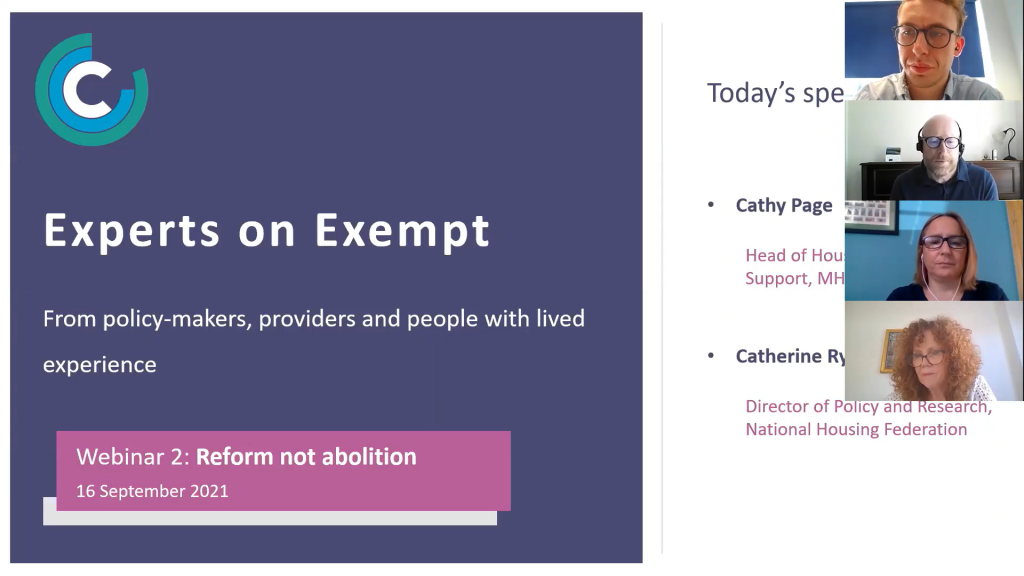
REFORM NOT ABOLITION: Vulnerable people are not getting the support that “they deserve for the money that is being paid” but we must “build on the good things” of exempt sector
The government is determined to “drive out the minority of landlords who provide poor-quality accommodation and insufficient support” in the exempt accommodation sector, but concedes that “there are no easy solutions” as Cathy Page, Head of Housing with Care and Support at the newly named Department for Levelling Up, Housing and Communities (DLUHC), laid out some of her vision for how to better reform the sector.
Page told the audience at the Commonweal Housing webinar series Experts on Exempt that the system is being unfairly gamed by some providers, meaning that “people are not getting the support that they deserve for the money that is being paid”.
She spoke about the value that supported housing brings to vulnerable people, saying it plays a “vital role in delivering better life outcomes”, and the government’s desire to work with stakeholders across the sector to ensure “all supported housing sustainable to meet the needs of the future”.
Catherine Ryder, the second presenter for the session and Director of Policy and Research at National Housing Federation who recently amended its membership policy for housing associations (HAs) to prevent HAs from entering the sector with the wrong intentions, agrees “It is really important to remember that non-commissioned, exempt or lease based does not necessarily equal bad and many of these schemes are providing vital homes and support for those in really acute needs.”
She continues, “supported housing is brilliant quality, fantastically run and makes a real difference to people who live in these homes and access the support they offer.” Ryder also noted the need for a joined-up approach, telling the audience, “There’s not one answer to this, many agencies need to play their part and many issues need to be addressed.”
The path to a reformed fairer and more equitable sector does not come without its challenges. Top of that list is “demand outstripping supply across all types of cohorts and client groups” coupled with “growth in poor-quality accommodation and support services … particularly around homelessness and rough sleeping”, Page told the audience.
With the session focused on Reform, not abolition, however, Page notes that there the government is committed to improving the quality of accommodation and services, and these are being means tested through the pilot schemes launched last year.
Some of the measures currently being considered and tested are more inspections, greater scrutiny of housing benefits, tenant support plans, better training to providers, and quality standards and a Charter of Rights, similar to that being pioneered by Birmingham City Council.
“Through the pilots we are trying to hear the residents voice not just looking at the provider and the local authorities. A lot more joined up working across within and across local authorities underpinned by multi-agency teams, and also, central points of contact for new supported housing and scheme enquiries” Page suggests.
Ryder supports the pilot schemes but said “Beyond the learnings from the pilots, we think local authorities should have the resources and capacity they need to ensure supported housing in their area is high quality and meets the needs of their communities.”
The clear message from the session was that supported housing was, and should be, here to stay, with Ryder saying “we need good quality supported housing, we need to be building houses, not just hanging to what we’ve got,” and that we must “empower” residents, and provider more and stronger regulation.
You can read and watch the highlights from our first webinar, The reality of the problem from those that have experienced it, by clicking here.
